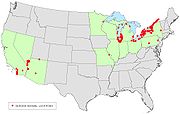
Lake Tahoe will be invaded! It's only a matter of time that Lake Tahoe will be invaded by the Zebra and Quagga Mussels. Both mussels have been moving west and have already contaminated a number of lakes and rivers in the U.S. Currently boats going into Lake Tahoe will be subjected to random inspections. Random inspections will not prevent mussel contamination. All it takes is one and that will be it. To understand how these mussels can impact Lake Tahoe read the excerpt taken from Wikepedia below. As taken from Wikepedia:
Quaggas are prodigious water filterers, removing substantial amounts of phytoplankton and suspended particulate from the water. By removing the phytoplankton, quaggas in turn decrease the food source for zooplankton, therefore altering the food web. Impacts associated with the filtration of water include increases in water transparency, decreases in mean chlorophyll concentrations, and accumulation of pseudofeces. Water clarity increases light penetration causing a proliferation of aquatic plants that can change species dominance and alter the entire ecosystems. The pseudofeces that is produced from filtering the water accumulates and impacts the environment. As the waste particles decompose, oxygen is used up, water acidity increases (decreased pH) and toxic byproducts are produced. In addition, quagga mussels accumulate organic pollutants within their tissues to levels more than 300,000 times greater than concentrations in the environment and these pollutants are found in their pseudofeces, which can be passed up the food chain, therefore increasing wildlife exposure to organic pollutants (Snyder et al., 1997). Another major threat involves the fouling of native freshwater mussels.
Dreissena's ability to rapidly colonize hard surfaces causes serious economic problems. These major biofouling organisms can clog water intake structures, such as pipes and screens, therefore reducing pumping capabilities for power and water treatment plants, costing industries, companies, and communities. Recreation-based industries and activities have also been impacted; docks, breakwalls, buoys, boats, and beaches have all been heavily colonized. Many of the potential impacts of Dreissena are unclear due to the limited time scale of North American colonization. Nonetheless, it is clear that the genus Dreissena is highly polymorphic and has a high potential for rapid adaptation to extreme environmental conditions, possibly leading to significant long-term impacts on North American waters. Also, the colonization of deeper water by D. r. bugensis, exposes the quagga to a new range of environmental conditions and new habitats.
It causes many of the same problems (damaging boats, power plants, and harbors and destroying the native mussel population) as the equally invasive zebra mussel of Russia. It is also displacing native burrowing amphipod (Diporeia hoyi) from the deep waters of Lake Erie.
In January 2007, quagga mussels were discovered at a marina in the Nevada portion of Lake Mead, and two other lakes on the Colorado River, Lake Mohave and Lake Havasu.[3]
In 2008 the threat of quagga mussels being introduced at Lake Casitas and Westlake Lake in California from recreational boating resulted in the lakes banning the use of outside boats.[4] As of March 2008, other lakes such as Castaic and Lake Cachuma are considering similar bans. In June 2008, the mussels were confirmed in Lake Granby, Colorado. The larva form of quagga mussels were found in the water. [5]
After talking with a number of biologists and other experts the prognosis is bad. It is commonly felt that Lake Tahoe will be invaded sometime within the next five years! The easiest way to possibly prevent non-native mussel invasion would be to not allow boats to leave the lake and allow no new boats into the lake. Anything other then that would simply a stalling measure. Of course boat limitations would create a HUGE political backlash. People want to be able to move their boats around. Lake Tahoe is an incredible lake and is already suffering from having motor powered boats in it and from other issues like climate change. If we are to protect Lake Tahoe from invasive species we should be prepared to take drastic steps even if they are uncomfortable ones.
